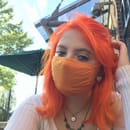Grace Dalton
I was diagnosed with moderate depression at 14 years old. I remember being at an assembly in eighth grade in my Catholic school, pretending to watch a presentation and all the while wondering why everyone else seemed perfectly normal while I felt like hurting myself all the time. I have been hospitalized twice for my suicidal tendencies, and have been in and out of therapy for five years now. Looking back at everything I’ve experienced, I would say the hardest part of mental illness for me was learning how to handle others’ mental illness while you are experiencing it at the same time.
We all know that as young women we shouldn’t be expected to advise our friends and family through times of extreme illness, no matter the state of your mental wellbeing. Generally speaking, most of us aren’t doctors and we’re certainly not getting paid for our efforts. Yet, if I asked you if you have ever had to talk to someone, likely a romantic partner or very close friend, out of harming themselves, or found yourself therapizing a loved one on a regular basis, I bet I could guess your answer, whether you consider yourself neurotypical or not. I could go on for pages about the link between the “nurturer” socialization of girls and the emotional intelligence expected from them at young ages, but I will digress. While I believe that everyone — no really, everyone — could benefit from therapy and that we all need to stop treating our inner circle as our personal, free-of-charge therapists, I especially think that people who are already compromised in their mental stability need to establish clear boundaries between themselves and their loved ones about the extent of venting that is healthy for both parties.
Gabby Taylor
Reflecting on my mental health and how it has impacted my life always varies. Part of me thinks about all the heartache, uncertainty and difficult conversations that have been caused from my anxiety and I wonder, “Why did all of this have to happen to me?” I wonder why I let myself believe the things my head was telling me and I think about the things I put my body through simply because of thoughts in my head that had no business being there.
However, when I put my pessimistic ways aside, I know that who I am today, the person I have come to love and care for, would not exist if it wasn’t for my mental health battle. I’m a firm believer in the golden rule, and my mental health journey has provided me with empathy, an open mind and a mentality that revolves around non-judgement. I value the mindsets of and beliefs of others, and I enjoy sitting with people and having those raw conversations about what we want out of life.
My mental health provided me with my dreams and goals for my future. I quickly realized that, because of my journey to love and understand myself, I wanted to have those raw conversations with anyone who was willing to have them with me, because it benefited them as much as me.
This being said, I decided I wanted to become a counselor for children in the elementary education system and have those innocent conversations with them about how important, special and valuable they are to the people in their lives and to themselves. I have also realized how badly I want children someday with the person I love, and how desperately I want to hold on to the friendships I have now because I know the bonds are strong enough to make it through all the highs and lows of my mental health battles. I wonder sometimes what I would want out of life if I didn’t have anxiety, but when I reflect on the beautiful things I want for my future now, I know wondering is pointless.
Like I said, my mentality toward my mental health varies. Part of me feels shame, guilt and worry for my own wellbeing as well as those who have been impacted by my own struggles. But then I think about the present, which is so much brighter and more hopeful than the past, and I’m determined to make the future even brighter. I see the sunshine, and despite the hardships of my mental health, I will forever be grateful for what it has given me.
Michelle Garcia
I used to be embarrassed by the fact that it takes swallowing three pills each morning for me to feel like a functioning human being. But I’m not anymore. I have borderline personality disorder, panic disorder, and bipolar disorder, and it’s taken me 20 years to proclaim that to the world without a shadow of fear. I say all of this proudly now because it’s part of my story of survival — and that’s a story worth telling.
I used to think I’d be broken forever. At least, high school Michelle did. I can’t trace the origins of my mental health struggles, but I do remember that they came early in life — chronic depression and anxiety from kindergarten through senior year, etc. I was a sea of unpredictable emotion and it paralyzed me. Sometimes it still shatters my heart thinking about how much of my youth I missed out on because of my illnesses, that I didn’t get to grow up like a lot of my classmates. I missed out on so many milestones because I was too preoccupied with figuring out how to stay alive. I didn’t know what it was like to be carefree.
Once I got to college, I decided to take matters into my own hands. I started face-to-face counseling and psychiatry, found medications and therapy programs that best address my needs, and have learned how to accept these parts of myself as parts worth loving wholeheartedly. Now, I channel my struggles into art, specifically, my creative writing and poetry. I also use my past experiences to start difficult conversations with others, encouraging vulnerability and transparency so that we may all collectively heal from our traumas.
I am now a Peer Assistant for Learning at Virginia Tech’s Cook Counseling Center, where I assist in campus initiatives to end the stigma against mental health. I am turning 21 next month, and I can confidently say that I am happy where my feet are.
Addison Keele
Mental health, both its awareness and importance, have become especially significant in my life over the past year and a half. Mental illness runs in my family and with the exception of mild anxiety, I never really had to confront any mental health issues until I got to college. The importance of maintaining your mental and physical wellness in college is painstakingly true. Between classes, extracurriculars, friendships, relationships, finances and navigating college life in general, your health and well-being can easily be impacted.
In January 2019, my life and mental health changed forever. I lost a close family member to suicide, and what devastated me the most was that I had no knowledge of her struggle. For years, she had been struggling off and on with anxiety and depression. Although I was a child throughout most of her struggle, I still felt guilty and that I had somehow played a role in her death. Why didn’t I text her more often? Call her more often? I hadn’t even seen her new house in North Carolina. Now I would never get the chance. How did I not see she was struggling? Was I really that oblivious? Why didn’t anyone want me to know? My family did say she had been sick, it was just that mental illness never even crossed my mind. The deep sadness, frustration and guilt I felt about her death contributed to my already fragile mental state. At the same time, I was dealing with the aftermath of a breakup and navigating a new relationship while also trying to repair a huge fallout with my best friends. My physical health was also compromised, and a few weeks later I got really sick and started breaking out. My acne was the worst it had ever been. I recall some days it was so hard for me to even get out of bed. I didn’t want to face the world, I didn’t want to do anything — I couldn’t do anything. My grades unfortunately suffered as well due to my lack of motivation. The little bit of motivation I had definitely wasn’t dedicated to doing schoolwork. In turn, my falling grades negatively impacted my self-image. I had always been a good student and had just ended my first semester with a 3.7 GPA. It was a lot for a freshman to handle. I didn’t even realize my mental health was being affected, and I definitely didn’t realize to what extent, until much later.
I eventually sought help through my friends, the Women’s Center and Cook Counseling at Virginia Tech. I also did a lot of self reflecting and research on my own and took up a few positive self-care habits. I’m in a much better mental state now, but I still have a long way to go. I still have bad days and struggle with my self-image at times. I still put enormous pressure on myself to be a certain person. My anxiety is still heightened from time to time. I am working on forgiving myself for my mistakes and still healing from those mistakes. I say all this to say: mental health awareness and well-being is so very important. It impacts everything we do, in ways we may not even be aware of. Mental illness is not anyone’s fault. Suicide is never anyone’s fault. Both can arise from several different things. When it happens, it’s easy to feel like you are somehow responsible, but please remember you are not. If you are dealing with any mental health issues, please remember you are so strong. Acknowledging your mental state and wanting to improve it takes a lot of courage and perseverance. You are never alone in your fight. Someone is always in your corner. I hope that everyone dealing with mental health issues can eventually find peace and comfort.
Ally Ford
Growing up I was never really aware of how mental illness had affected my family. I think when you’re young, you kind of just accept the world for how it is and people for how they are. If someone acts strange or different than normal, you brush it off as a bad day and don’t think much of it. But as we get older, we learn more about ourselves and others, and we’re able to see things we once couldn’t. Our eyes widen, and we’re able to see the full picture. It wasn’t until many years later that I learned how much my dad struggled with mental illness, specifically bipolar disorder, anxiety, depression and PTSD. Knowing what I know now, the signs were obvious when I was younger — I was just naive. The amazing thing about mental illness is that it’s genetic, which means that I inherited some of the driving forces behind my dad’s unhappiness in life. I was diagnosed with anxiety in 2014 and depression in 2015, which changed my life forever, both for the worse and the better. I struggled deeply with anxiety, depression and an eating disorder for a long time, and even though I’m better now than I used to be, there are still times when I become overwhelmed. I find that during any time of high stress I lose myself to anxiety and depression; I become so wrapped up in the stress of life and I forget all of the coping mechanisms I learned in therapy or taught myself and anxiety takes over. If I’m being honest, I was ashamed of my mental illnesses and the fact that I went to therapy for a long time. I kept them a secret and hid my emotions from everyone; I’m naturally a person who doesn’t like to talk about how they feel or let others know that I’m struggling, which made things hard for me.
But out of all the bad, there is good. I’ve learned so much about myself over the years and the bad has brought my small family even closer, bonded through the bad experiences. I’ve since realized that there is nothing to be ashamed of for going to therapy and having struggles you can’t overcome by yourself. Sometimes we all just need a little help, and that’s OK. Mental health is a battle that many fight, some silently, but it’s time to speak up and speak loud. I’m not afraid or embarrassed to tell my story even though it has and continues to cause me so much pain. If someone can hear my story and learn from it, that’s all that matters to me. Please seek help if you need it — there is no shame in looking to brighten the dark spots of your life.
Sally Morrison
Oct. 10 is World Mental Health Day, and while I know every day we should be recognizing mental health awareness, it is important to have special days dedicated to things that are often overlooked. Normally I would post a little graphic on my Instagram story to recognize this day, but I also believe that we should get rid of the stigma around mental illness and I have reached a point in my life where I am ready to walk the walk and share my story with the world. Anyways, my mental health journey started at the ripe age of seven, and that’s when I started to see a therapist. At that age, I was so young and I didn’t realize what was wrong with me and why certain things made me feel a certain way. I nicknamed my mental illness “the worries” and I was ashamed of it. Throughout my childhood I went through random periods where my mental illness hit a low point, and I would go see a therapist to talk through my problems. To this day, even though I am in a good place, I continue to occasionally see a therapist and it is one of the best things for me and my mental health to have someone to talk to.
I have always been an outwardly happy, optimistic and enthusiastic person, so the fact that I do have depression, anxiety and OCD does come as a shock to many. However, it is important to recognize that even the people who seem like they have their life together may also be struggling with something that no one knows about. In high school, having the ability to be involved with a local foundation is something that I am forever grateful for. The Cameron K. Gallagher Foundation works to shine a light on teenage mental illness through in-school programming, community service and a huge 5k every September that truly gets the Richmond community together to rally for awareness. I loved sharing Cameron’s story with my high school, and this foundation truly spreads a message that I will forever motivate and hold with me.
Mental illness is a real thing, and as a society we need to do better. It is important to be compassionate and check in on your happy friends because you never know what someone may be going through.
Jessica Mardian
As someone who struggles with her mental health, World Mental Health Day means a lot to me — especially this year. Around this time last year I was in a depressive state that I didn’t think I would be able to get out of; the days just moved through me and it’s like I wasn’t really there. The catalyst was a breakup, though I had been breaking slowly in the months before. I had internalized the stigma around therapy and being seen as weak so much that I tried to avoid calling a therapist for an appointment. I’m not even sure where exactly I got the idea that going to therapy was weak, because that’s so wrong. Now, eight months later, I’m in a much better place and therapy taught me to validate my emotions and create boundaries.
Anonymous
When I was 10 years old I was diagnosed with severe OCD and anxiety. 10 years old — I hadn’t even had my first period or first kiss yet and the stress of anxiety and mental disorders was already plaguing my life. I started therapy that year, my first year of middle school; a year when I was supposed to be making new friends and expanding my horizons to new and exciting opportunities. Instead I spent every Monday and Wednesday night from 4 to 5 p.m. in the lounge chair in my therapist’s room discussing the worries I experienced everyday and the tics that would send me into a frizzy of inconsolable bouts of anxiety attacks.
10 years later at the age of 20 I now have a handle on my OCD for the most part; there are days when I am OK and don’t have any fits and I go about my day as normal. But then there are days, usually stressful ones, that causes flare-ups and I relapse to my old tics where I have to lock my car three times before I can leave it parked, or else somebody will for sure break into it, and have to shake my hands off 20 times after washing them to ensure they’re dry enough or else they wouldn’t be considered clean and I would have to start all over again.
But for the most part, I’m OK now. The OCD that used to plague my life isn’t really around anymore, and I’m mostly just impacted by anxiety on a daily basis. I have pills that I take for my anxiety on certain days when I don’t think I’ll be able to get through the day without an anxiety or panic attack. But for the most part, I’m OK.
There is a stigma that surrounds mental illness, and while most people think there isn’t one, but believe me, there is. My parents told me when I was first diagnosed not to tell anyone, not even my little brother. I never understood why and I thought better not to ask back then, but years later I asked them why and their answer was they didn’t want people to know and hold the fact that I suffered from one, at such a young age, against me. They wanted to protect me, even now, from the cruelty of the real world. My parents never treated me like I was different, they treated me and my brother the same and supported me in everything I did in my life and, honestly, I’m thankful that they did what they did because to this day most people don’t suspect a thing. To the untrained eye, I’m the world’s definition of “normal”.
So to this day, only a select few people, outside of my parents and brother, know about my OCD and anxiety. Some people figured it out on their own, like my coach from the year when I was diagnosed. He came up to my parents about a week or two after I joined his team and asked if I had OCD, to which my parents responded yes. He said, “Fantastic, the best athletes have OCD, it’s what gives them a competitive edge and fuels their fire to be better than the competition.” I think more people should be like him. He didn’t treat my OCD like it was something that ostracized me from the rest of the kids; he viewed it as something that made me different, that made me better, that made me, well, me. To make it that much better, this man was an educator, a high school chemistry teacher and the coach of one of the best high school teams in the state for over 10 years.
If more people, especially adults, were like him, then there wouldn’t be the stigma that surrounds mental illness today. I, to this day, wouldn’t be afraid to put my name on this article and tell my story to the world. My parents and I wouldn’t live in fear about how people would treat me if they found out about my OCD. Maybe one day I’ll be able to tell my story to the world without fear about how people would react. But I am proud of who I am, I wouldn’t change anything about me, mental illnesses and all. For now though, I wait for the day when there is no longer a stigma, and hopefully it’s one day soon.
Anonymous
Mental health is something I have to think about every day of my life, normally from below my weighted blanket or post anxiety attack. I start off the day with the medication I need to keep my OCD at bay. I try to eat healthy and chug decaf coffee to keep my anxiety at bay. I tried, and failed, to forget my PTSD by avoiding physical contact or remembering too much.
It doesn’t always work. Even before COVID-19 I spent hours stuck in obsessive cycles. Today I woke up to find my anxiety sitting on my chest like a hungry lion. I’ve lost more days to PTSD than I care to admit, and some days my mental health weighs on me more than any anxiety blanket.
But my mental health isn’t the only thing I think about in a day. My mornings begin with me checking my agenda and attempting to go to the gym. I eat healthy so I can go wild when out with friends. I use my memories to get me to come back to life.
When my mental health sneaks through the cracks, I show it. I can display my awful sense of humor, my fear of spiders and inability to do math with pride. So the least I can do is respect my mental health and myself enough to acknowledge it, treat it and try to live with it. Without letting it make me feel less alive.
Anonymous
My experience with mental health isn’t really something I talk about a lot, and if I did I would most likely say it’s really short and not a big deal. The reason being is because I haven’t actually gone to a doctor or therapist to really be diagnosed with depression or anything. I think I’m just scared to go or I really hate talking about what’s going on and how to deal with certain situations. I’m the kind of person who doesn’t openly talk about my emotions or express much of what I feel. When I walk outside the house, I’m a whole new person and someone you would basically assume whose life is fine. But there are days where I literally just do not do anything and sit by myself and stare into space and overthink a lot. The way I cope with my issues and stress around me is by listening to music and just thinking that there will be something for me in the future. It’s a slow process and it seems like nothing is going right, but I can never see myself ending it all or just putting myself at rock bottom. While I may think I hit rock bottom sometimes, I know I didn’t actually and it’s just a rough patch I really need to push myself over. My mental health isn’t horrible but it definitely does get to certain points where I feel lost and don’t know how to do anything. But I always hope for something better; there’s always that small push in my head where I know something good can come out in the future. It’s that small little push that drives me and I hope that sharing this helps others in the sense that even if you don’t really know what’s going on and you don’t want to openly share it with people, try to find it within yourself because you know yourself more than anyone.
If you’re struggling with mental illness and feel like you need help, we encourage you to seek it.
Cook Counseling Center: (540) 231-6557 https://ucc.vt.edu
National Suicide Prevention Hotline: (800) 273-8255








